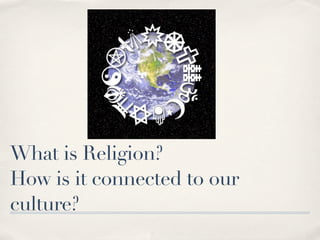
What is religion
- 1. What is Religion? How is it connected to our culture?
- 2. Religion has a very long history. It started with the Ancient beliefs (often known as Mythology) and in our modern world there are many new beliefs and faiths. People started having faith in something as they trusted that idea or action. As history went on people were putting more trust into their beliefs and with that they became loyal to their faith. Religion is different for different people and cultures. In some cultures the traditions are very closely connected to their belief or religion. A tradition is a custom that has been handed down through generations. For example, your family might gather on special days, wear special clothing on certain days, and/or share certain foods. Therefore there are some beliefs that exist only in a specific area. Traditional beliefs all share a common belief in powerful spirits that can change or shape lives. Some People belong to a faith/religion through their parents, i.e. were born into it. There are many people though, that choose to belong to a faith later on in their life. In most people’s life, religion does not need any definition as it is part of their every day life. The picture shows the Greek God of the four Winds. Text
- 3. Religion is a way of explaining the mysteries of life. Most religions try to explain questions people have such as: How was the world created? Why was it created? What happens after people die? Why is there suffering? Today, we know the answers to a lot of questions about how the world works. Yet many things in life are still a mystery. Faiths/Religions offer answers to some of these questions. Before writing was invented, people passed on their answers or explanations through their word and actions. The teachings and ideas behind some of the world’s religions were eventually written in sacred documents.
- 4. In the Ancient world people trusted in Gods/Goddesses or spirits, as well as believing in the power of the natural world. People think if they stay loyal to their Gods or spirits, it will make them happy. If a god or a spirit is happy it will give people a good life. Therefore Religion is a way of worshipping the “creator(s)” or spiritual beings, whom are believed to have power over the world and people’s lives. People who follow a belief, will often pay their respect by praying to their “leader” and/or giving him/her offerings. A prayer is a way of saying thank you and expressing wishes. These prayers or worships are often done in sacred places and spaces. This can be a private or a public space. Temple Synagogue Christian Church
- 5. People who worship, will often have special celebrations. They help the people to remind them of their belief and the history of their belief. Some celebrations are to mark a new year or season. The major Faiths have spread across the world, due to various reasons, Immigration/Migration being one of them. Nowadays people live in communities where there is a mix of different nationalities and faiths. Living in a mixed culture helps us to learn and respect other Religions. Even if you don’t have a faith or religion, you should always be tolerant of them.
- 6. Some Facts The largest main World religions are: 1. Christianity (~ 2.1 billion people) 2. Islam (~ 1.3 billion people) 3. Hinduism (~ 900 million people) 4. Budhism (~ 376 million people) 5. Sikhism (~ 23 million people) 6. Judaism (~ 14 million people) Hinduism is one of the world’s oldest living religions and is also referred to as “eternal teaching”. Jews are born into their faith, so if your mother is a Jew you automatically are also a Jew, whether you practice your faith or not. Buddhism and Sikhism were developed through a person who really existed. One of the most recent founded religion is called Rastafarianism and is mainly seen in Jamaica, but has also spread to the US and Europe. Religion has been a powerful force in the development of different cultures. In many places religion still has a major influence on peoples communities. Some people also think that religion has had a bad influence, causing wars for instance. There are still countries, such as Iran, which are still governed by religious leaders. This often affects the way people live, get educated and the laws they follow. Many Charities have religious origins and have a big affect on peoples lives, for example in areas that have been struck by a disaster.
Hinweis der Redaktion
- \n
- \n
- \n
- \n
- \n
- \n